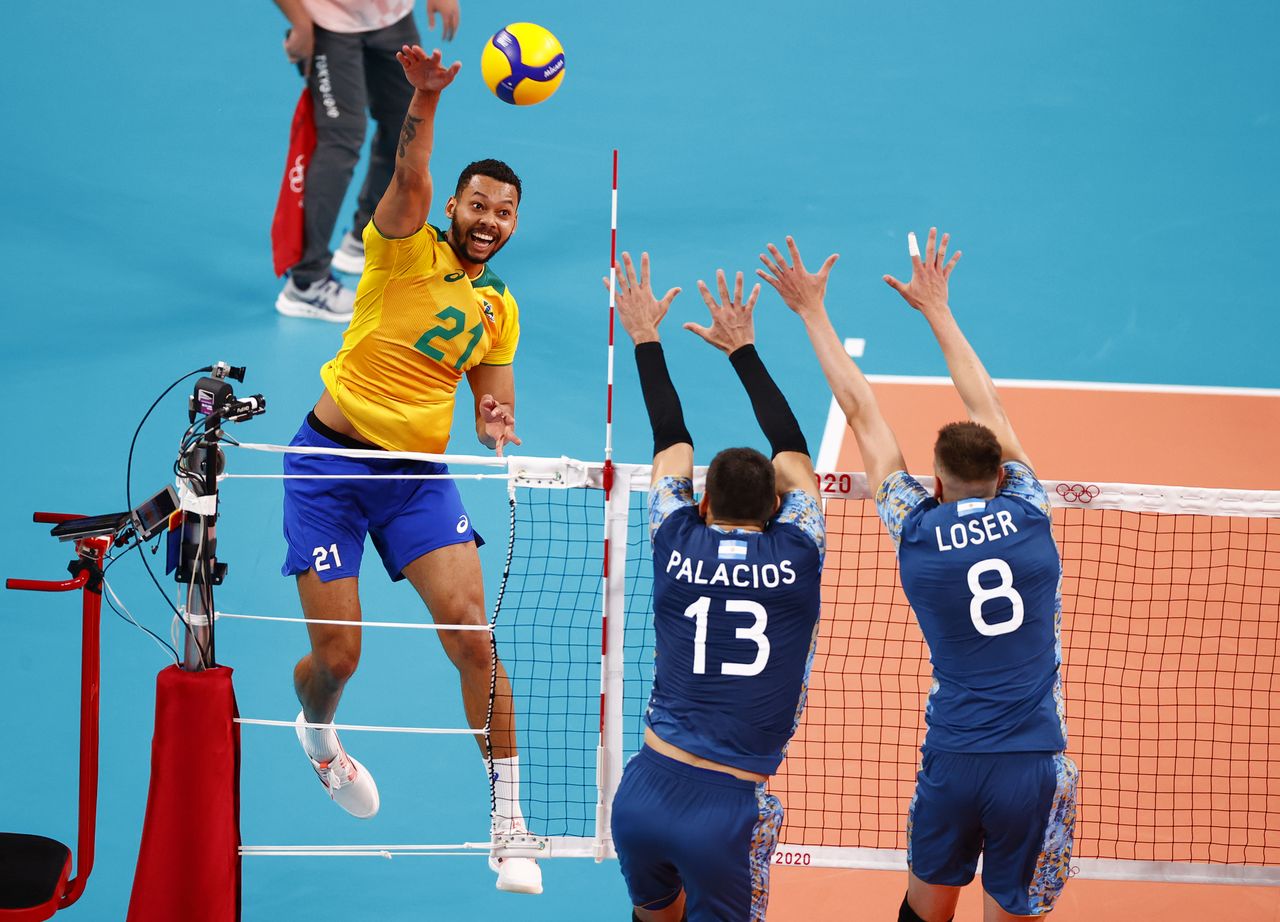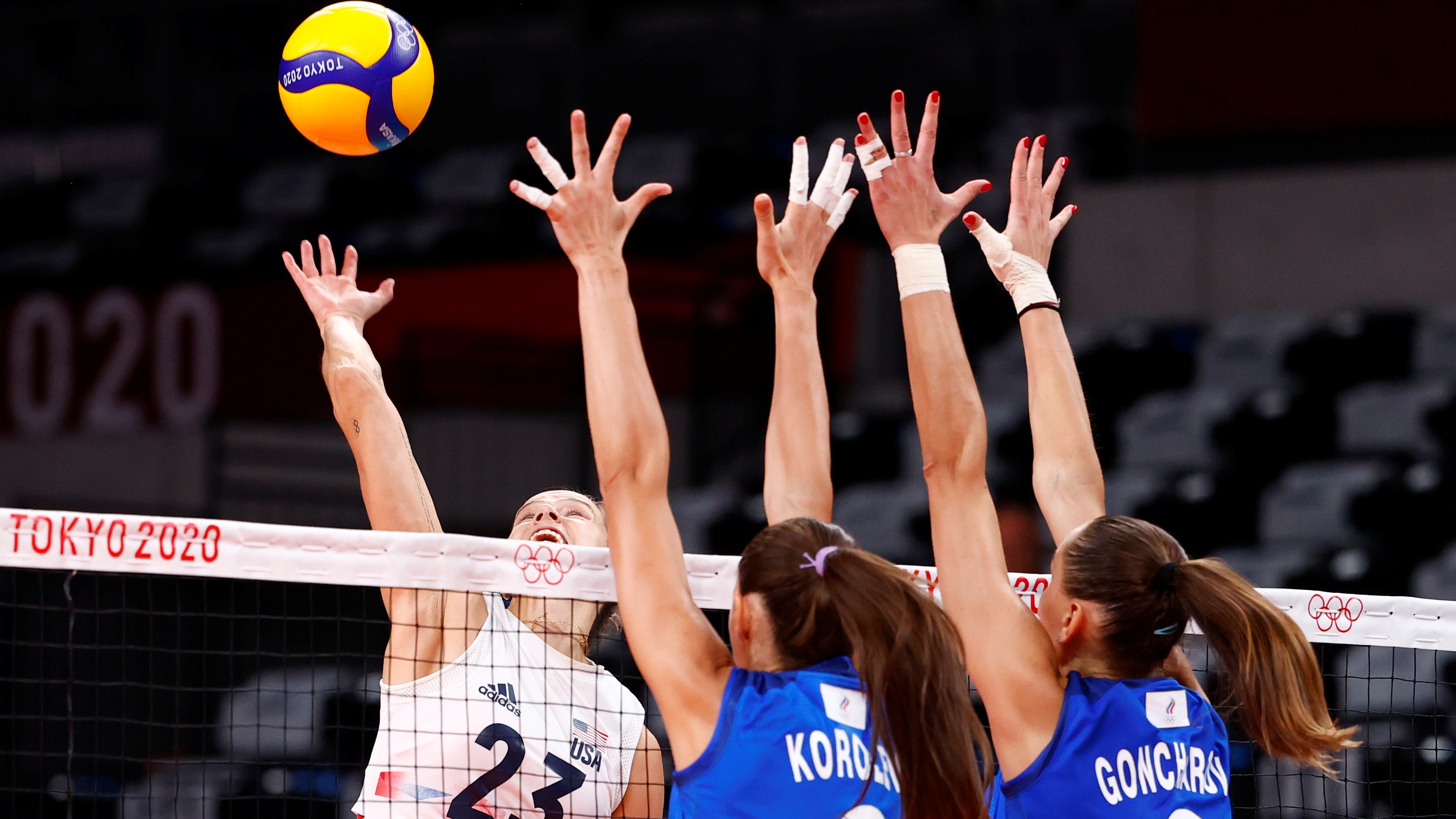History and Evolution of Volleyball at the Summer Olympics: Volleyball At The Summer Olympics Schedule And Results

The history of volleyball at the Summer Olympics is a captivating journey that reflects the sport’s remarkable growth and evolution. From its humble beginnings as a recreational activity to its status as a globally recognized and intensely competitive sport, volleyball has left an indelible mark on the Olympic Games.
Origins and Inclusion in the Olympics
Volleyball was invented in 1895 by William G. Morgan, a physical director at the YMCA in Holyoke, Massachusetts. Morgan sought to create a less physically demanding sport than basketball, which was gaining popularity at the time. He named the new sport “mintonette,” but it was soon renamed “volleyball” due to its characteristic use of the ball.
The sport’s popularity spread rapidly, and by the early 20th century, it had become an established fixture in physical education programs and recreational settings. However, it was not until the 1964 Tokyo Olympics that volleyball made its official debut as an Olympic sport. This marked a significant milestone in the sport’s history, elevating its status to the global stage.
Evolution of Rules and Format
Since its introduction in the Olympics, volleyball has undergone several rule changes and format adjustments. These changes have been driven by a desire to enhance the sport’s competitiveness, spectator appeal, and overall playing experience.
- Initially, volleyball was played with a 9-player team, but this was later reduced to 6 players per team. This change streamlined the game and made it more dynamic.
- The scoring system has also evolved over time. In the early years, a team needed to win 15 points to win a set. This was later changed to 25 points, and then again to 21 points for the Olympic Games.
- The introduction of the libero position in the late 1990s revolutionized the sport. The libero is a specialized defensive player who can only play in the back row and is not allowed to attack the ball. This change added a new dimension to the game, emphasizing defensive skills and tactical flexibility.
Notable Moments and Significant Changes
The history of Olympic volleyball is filled with memorable moments and significant changes that have shaped the sport’s evolution.
- The first Olympic volleyball tournament was held in Tokyo in 1964, with the Soviet Union winning the men’s gold medal and Japan winning the women’s gold medal.
- The 1996 Atlanta Olympics witnessed the introduction of beach volleyball as an Olympic sport. This addition further expanded the appeal of volleyball, attracting a new audience and highlighting the sport’s versatility.
- The 2000 Sydney Olympics saw the introduction of the rally scoring system, where points are awarded for every rally, regardless of which team serves. This change made the game faster and more exciting for spectators.
Competition Format and Rules

The Olympic volleyball tournament is a captivating spectacle of athleticism and strategy. The format, rules, and scoring system all contribute to the excitement and drama of the competition.
Volleyball at the summer olympics schedule and results – The competition is divided into two distinct categories: indoor volleyball and beach volleyball. Both formats feature pool play and knockout stages, with the ultimate goal of securing the coveted Olympic gold medal.
Pool Play
The pool play phase is a crucial stage where teams compete against each other within their designated groups. The outcome of these matches determines their seeding for the knockout stages.
- Teams play against each other once in their pool, with the top teams advancing to the knockout stages.
- The number of teams in each pool varies depending on the number of participating teams.
- The ranking within each pool is determined by the number of wins, sets won, and points scored.
Knockout Stages, Volleyball at the summer olympics schedule and results
The knockout stages are a high-stakes phase where teams face elimination after each loss. The competition intensifies as teams strive to reach the final.
- The knockout stages consist of a series of single-elimination matches, where the loser is eliminated from the tournament.
- The top teams from each pool advance to the knockout stages, with the seeding determined by their pool play performance.
- The knockout stages culminate in the final match, where the two remaining teams compete for the Olympic gold medal.
Scoring System
The scoring system in volleyball is based on points, with the team reaching 25 points first, with a two-point lead, winning the set. A match consists of a best-of-five set format.
- A team scores a point by successfully landing the ball on the opponent’s court or by forcing the opponent to commit a fault.
- The first team to reach 25 points wins the set, provided they have a two-point lead.
- If the score reaches 24-24, the set continues until one team gains a two-point lead.
- A match consists of a best-of-five set format, with the first team to win three sets being declared the winner.
Rules of the Game
Volleyball is a dynamic and strategic sport with a set of rules that govern the play. The rules are designed to ensure fairness and promote exciting competition.
- The game is played by two teams of six players each, with the objective being to score points by landing the ball on the opponent’s court.
- The ball can be hit with any part of the body above the waist, but it cannot be caught or held.
- Each team has three touches to return the ball to the opponent’s court, with the exception of the libero, who can touch the ball an unlimited number of times.
- The ball must be served over the net and into the opponent’s court.
- A player cannot step on or cross over the center line.
- A team is awarded a point if the opponent commits a fault, such as hitting the ball out of bounds or failing to return the ball within three touches.
Key Differences between Beach Volleyball and Indoor Volleyball
While both beach volleyball and indoor volleyball are played with the same objective of scoring points by landing the ball on the opponent’s court, there are significant differences between the two formats.
- Number of Players: Beach volleyball is played with two players per team, while indoor volleyball is played with six players per team.
- Court Size: The court for beach volleyball is smaller than the court for indoor volleyball.
- Playing Surface: Beach volleyball is played on sand, while indoor volleyball is played on a hard court.
- Scoring System: The scoring system in beach volleyball is different from the scoring system in indoor volleyball.
- Rules: There are some differences in the rules between beach volleyball and indoor volleyball, such as the rules regarding blocking and substitutions.
Recent Olympic Volleyball Results and Trends

The Summer Olympics is the pinnacle of international volleyball competition, showcasing the world’s best athletes and teams. Analyzing recent Olympic results reveals dominant teams, evolving playing styles, and fascinating trends.
Medal Winners of the Last Three Summer Olympics
The medal winners of the last three Summer Olympics provide a snapshot of the sport’s current landscape.
| Year | Indoor Volleyball (Men) | Indoor Volleyball (Women) | Beach Volleyball (Men) | Beach Volleyball (Women) | 2016 Rio | Gold: Brazil | Gold: China | Gold: Brazil | Gold: Brazil | Silver: Italy | Silver: Serbia | Silver: Italy | Silver: Germany | Bronze: USA | Bronze: Netherlands | Bronze: Netherlands | Bronze: USA | 2020 Tokyo | Gold: France | Gold: USA | Gold: Norway | Gold: USA | Silver: Russia | Silver: Brazil | Silver: Latvia | Silver: Australia | Bronze: Argentina | Bronze: Serbia | Bronze: Latvia | Bronze: Switzerland | 2024 Paris | TBD | TBD | TBD | TBD |
|---|
Dominant Teams and Players in Recent Olympic Volleyball History
The recent Olympic volleyball history has been marked by the dominance of a few teams and players.
* Brazil has been a force in both indoor and beach volleyball. They have won the men’s indoor volleyball gold medal in 2016 and the women’s beach volleyball gold medal in 2016.
* USA has also been a dominant force, winning the women’s indoor volleyball gold medal in 2020 and the women’s beach volleyball gold medal in 2020.
* Serbia has been a consistent contender in women’s indoor volleyball, winning the silver medal in 2016 and the bronze medal in 2020.
* Italy has also been a consistent contender in men’s indoor volleyball, winning the silver medal in 2016.
Some of the most dominant players in recent Olympic history include:
* Serbian player Tijana Bošković is widely considered one of the best female volleyball players in the world. She has been a key player for Serbia’s success in recent Olympics.
* Brazilian player Bruno Rezende is considered one of the best setters in the world. He has been a key player for Brazil’s success in recent Olympics.
* American player Kerri Walsh Jennings is considered one of the greatest beach volleyball players of all time. She has won three Olympic gold medals in beach volleyball.
* Brazilian player Alison Cerutti is considered one of the best beach volleyball players of all time. He has won two Olympic gold medals in beach volleyball.
Trends in Team Performance and Playing Styles
Recent Olympic volleyball has seen several trends emerge in team performance and playing styles.
* Increased Emphasis on Speed and Agility: Volleyball has become increasingly fast-paced and dynamic. Teams are emphasizing speed, agility, and quick reactions to adapt to the rapid pace of the game.
* Importance of Defensive Specialization: Defensive specialization has become crucial. Teams are employing dedicated libero players, who specialize in defensive skills like digging and receiving serves.
* Evolution of Serving Strategies: Serving strategies have evolved, with teams employing more aggressive and diverse serves to disrupt the opponent’s reception.
* Strategic Use of Technology: Teams are increasingly using technology to analyze opponents, optimize training, and develop game strategies.
* Growing Popularity of Beach Volleyball: Beach volleyball has gained significant popularity in recent years, attracting a wider audience and showcasing a more dynamic and entertaining style of play.
The Summer Olympics volleyball schedule and results are always eagerly anticipated, with fans worldwide tuning in to witness the world’s best athletes compete. The women’s volleyball tournament is particularly exciting, showcasing incredible skill, teamwork, and athleticism. Looking ahead to the 2024 Games in Paris, women volleyball olympics 2024 promises to be a thrilling event, with top teams vying for the coveted gold medal.
The anticipation for the 2024 tournament is high, and the competition is sure to be fierce, with athletes aiming to secure their place in Olympic history.
The Summer Olympics volleyball schedule and results offer a thrilling glimpse into the world’s top athletes competing for gold. After a long day of cheering on your favorite teams, consider unwinding with a taste of the tropics by exploring blue chair bay rum online.
Its sweet and fruity flavors will transport you to a beachside paradise, allowing you to relive the excitement of the games from a relaxed perspective.
